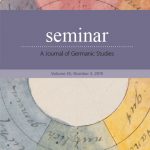 A Special Issue of Seminar: A Journal of Germanic Studies (Web); Simone Pfleger and Maria Roca Lizarazu
A Special Issue of Seminar: A Journal of Germanic Studies (Web); Simone Pfleger and Maria Roca Lizarazu
Proposals by: 15.01.2021
Throughout the past decade, scholars in critical race, queer, disability, and animal studies such as Rosi Braidotti, Judith Butler, Mel Y. Chen, Eunjung Kim, Dana Luciano, Jasbir K. Puar, or Dinesh Wadiwel have grappled with questions of what constitutes default forms of humanness, how these are upheld and by whom, as well as whether humanity has a future. Indeed, such inquiries question the ways in which humanness is linked to productivity, autonomy, and the ability to manifest normative bodily features as well as identity markers determining whose is legible as a „proper“ body. These inquiries have illustrated that such normativity is the basis for exclusion, thus fostering a deeper understanding of how, in certain contexts, some subjects are understood as disposable, replaceable, or unworthy of care, and how they are denied access to certain rights, face objectification, and are exploited.
In order to address this normativizing power underpinning the concept of being human, this special issue seeks to take an anti-racist, anti-ableist, anti-violence, feminist-queer approach, in order to trace how concepts of non-normativity allow a critical interrogation of the category of humanness itself. The issue proposes that the anti-ableist queer ethics of „inhumanism“ (Eunjung Kim, 2015) problematizes the glorification of the category of the human as powerful, sovereign, bounded, and agentic. Kim’s notion of „inhumanism“ focuses on the fundamental questions of what it means to be human and why the category itself inscribes sets of capacities and characteristics that render only certain bodies and modes of existence recognizable, valuable, and worthy of rights and protection.
Through the notion of „being in/human“, this special issue seeks to explore ideas of un/becoming human and their relatedness to social and cultural power structures. Foregrounding relationality, the editors encourage submissions that consider whether and how individuals are able to persist against the dictates of productivity and the aggressive human expectation to be accommodated by the world. How might becoming in/human allows us to exist in different ways and explore alternative forms of sociality and kinship? How can theoretical, literary, filmic, and artistic approaches, such as, for example, those of May Ayim, Sheri Hagen, Angelina Maccarone, Sharon Dodua Otoo, Hans-Christian Schmid, Ulrich Seidl, Sasha Marianna Salzmann, Maria Speth, Antje Rávic Strubel, Feridun Zaimoglu, and Juli Zeh, enable us to resist the ongoing precarization of bodies and the demand for agency, sovereignty, and productivity? How may being in/human, and the subjectivities and artistic renditions going with it, pose a productive challenge to (homo- or hetero-)normative, cis, able-bodied, white, middle class constructions of the consumer citizen subject? Can different textual and contextual figurations challenge the status of humanity as a locus of sovereignty and power, open possibilities for new imaginations of being in the world, and underscore the limitations of notions of agency and ability?
The editors seek approaches to notions of in/humanism across media, cultural traditions, and historical periods of the German-speaking world as they engage with analytical frameworks that emerge out of disciplines such as feminist, gender, critical race, queer, Indigenous, and disability studies to interrogate the possibility of objecthood and in/humanism as an antisocial mode that underscores a refusal to become what society demands.
Topics may include but are not limited to the following:
– processes of othering
– ontological reimaginings
– objectification and dehumanization
– agency and sovereignty
– dis/ability
– passivity, unproductivity and refusal
– non/belonging
– queer modes of kinship and sociality
– relationality with land and locatedness
– non/binarity
– im/mobility, migration, displacement
– climate change and its effects
Please submit 300-word abstracts and short biographies (max. 150 words) to Simone Pfleger (pfleger@ualberta.ca) and Maria Roca Lizarazu (M.RocaLizarazu@bham.ac.uk) by January 15, 2021. Depending on the outcome of the editorial review of the abstracts, full manuscripts (not exceeding 8,000 words) will be invited for peer review. The deadline for the submission of first drafts of articles will be July 1, 2021.
Additionally, the editors are planning on hosting a symposium and writing workshop in August 2021 to provide accepted proposal authors with the opportunity to engage more deeply with some of the theoretical concepts that inform the notion of in/humanness and to receive feedback on their essays. The symposium will also feature a keynote address and an invited artist. Please note that authors are expected to participate in the symposium if their proposals are accepted by the editors.
Source: H-Net Notifications
